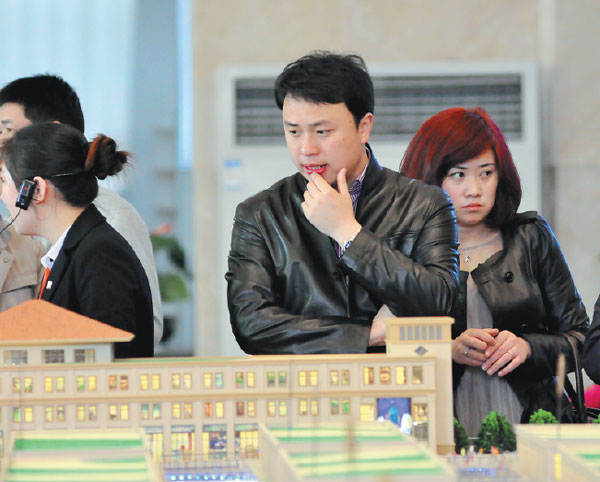Property weakness overhangs recovery
Nation's economy improves in May, but the figures are still 'patchy', analysts say
The economy improved marginally in May, but analysts said the recovery remains patchy, with continued weakness in the property sector representing the largest uncertainty.
Among a slew of key economic data the National Bureau of Statistics released on Friday, industrial output and retail sales offered some comfort for policymakers.
|
A man inspects a property model display in Rizhao, Shandong province. Property investment during the January-May period rose 14.7 percent year-on-year, down from a 16.4 percent pace in the first four months. Provided to China Daily |
Industrial output rose 8.8 percent year-on-year in May, up from 8.7 percent growth in April.
Retail sales increased 12.5 percent, up from11.9 percent in April.
However, growth of fixed-as-set investment (excluding rural households) slowed to 17.2 percent in the first five months, down from 17.3 percent from January to April.
The slowdown largely reflected a deceleration in property investment. Investment in that sector during the January-May period rose 14.7 percent, down from a 16.4 percent pace in the first four months. Residential property investment slid from 16.6 percent growth in the January-April period to 14.6 percent in the first five months.
Behind the decline in property investment is the slump in housing sales and prices that started early this year.
Real estate investment directly affects about 40 other business sectors in China, from steel and cement to furniture, and is a crucial driver of economic activity.
Tang Jianwei, an economist at Bank of Communications Ltd in Shanghai, noted that overall fixed-asset investment growth didn't plummet because the real estate investment downturn was offset by higher infrastructure investment, which rose 25 percent year-on-year.
That growth rate was 2.2 percentage points higher than in the first four months, according to the NBS.
"This is the result of a number of measures adopted by the central government since April and the acceleration of fiscal spending," said Tang.
The State Council, China's cabinet, announced growth boosting measures in early April that included faster construction of railway projects and public housing. Meanwhile, in March, the Finance Ministry ordered local governments to accelerate their fiscal spending.
As a result, fiscal spending grew 24.6 percent year-on-year in May to 1.3 trillion yuan ($208 billion). Most of the additional spending involves urban renovation and water conservation.
Tang said because of the time lag and local implementation issues, the full effect of the soft stimulus from Beijing would be felt in the coming months, but the weak improvement in May might not be enough to keep the government from announcing more stimulus policies.
"Frankly speaking, the latest figures are a bit disappointing. The economy may be stabilizing, but there is no sign of a strong rebound," Tang said, adding that faster retail sales growth was actually boosted by higher consumer inflation.
Real growth in retail sales in May was 0.2 percentage point less than in April.
Zhang Zhiwei, chief China economist at Nomura Holdings Inc. agreed. He said that China's policy easing has "become significant" from a macro perspective," but further easing measures are likely in the next few months that will lead economic growth to "rebound slightly" to 7.5 percent in the third quarter from an estimated 7.4 percent in the second quarter.
The top leaders have indicated that they are more serious about the 7.5 percent growth target, as Premier Li Keqiang said on Tuesday that the government will intensify fine-tuning and focus on making "targeted changes" in policy.
He announced on Thursday that the government will boost public investment in transport infrastructure in the Yangtze River basin and lower some utility companies' taxes.
Tang said the "targeted easing" is needed but cautioned that an all out stimulus package is unnecessary as the country is pursuing reform.
zhengyangpeng@chinadaily.com.cn


























